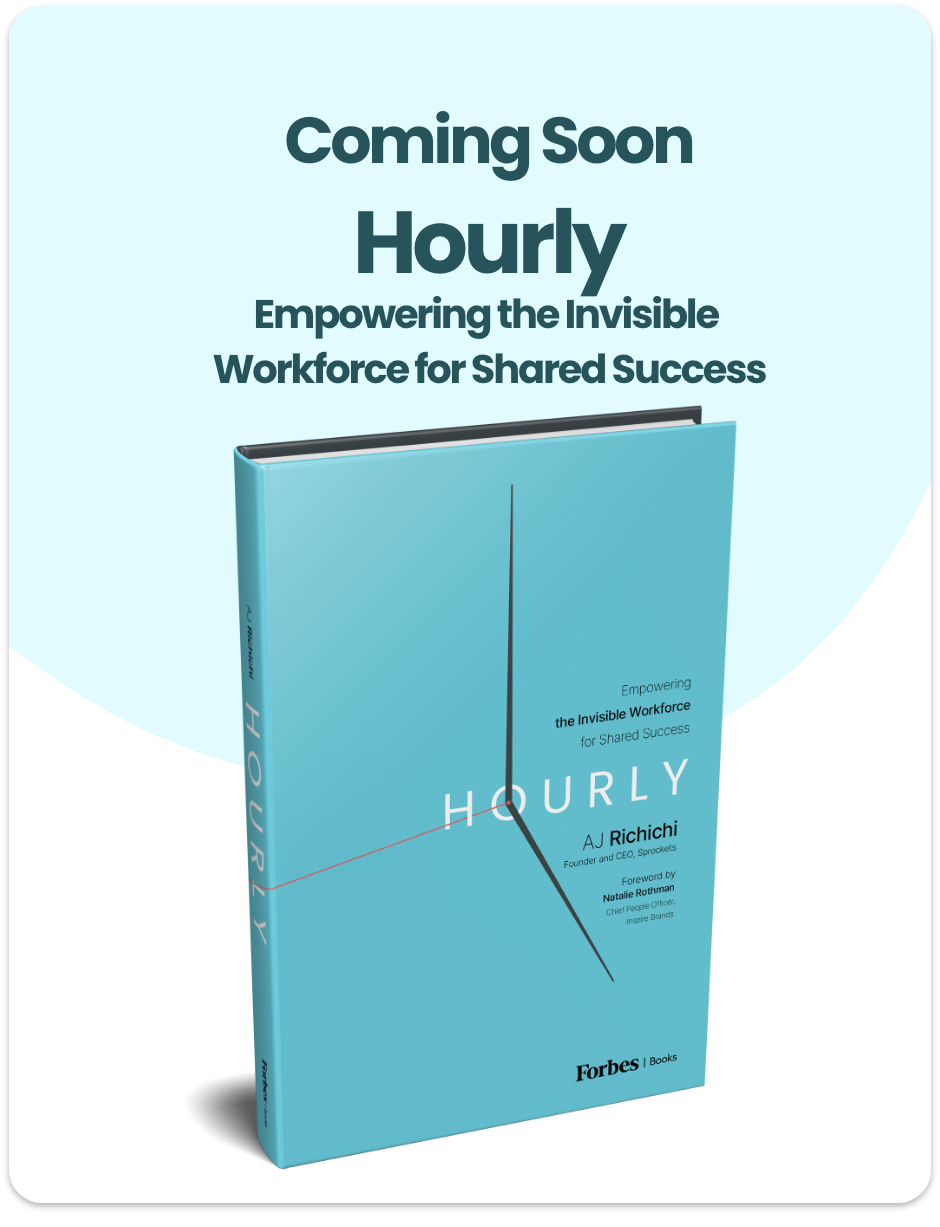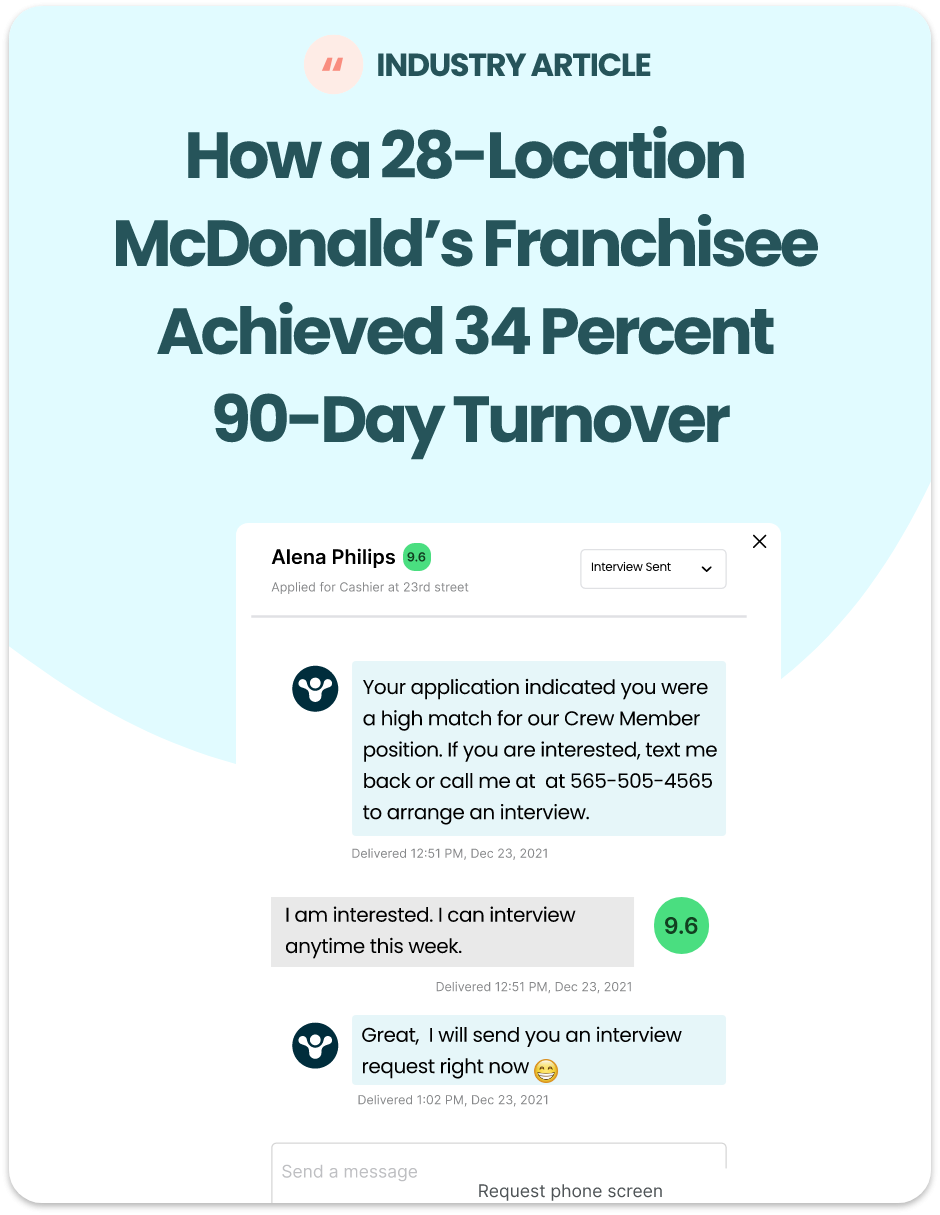Check out our fourth podcast episode of Talent Talk with our guest, Katy Ditchfield who discusses the challenges and solutions she has seen come to light while trying to recruit and hire in a tight labor market. Katy is the head of HR at Equiscript, which improves people’s access to healthcare.
Chad | Sprockets:
Hi, good afternoon and welcome to another episode of Talent Talk. My name is Chad Troutman, the Chief Marketing Officer here at Sprockets. And with me today, I have Katy Ditchfield from Equiscript. She is the Head of HR there and we’ll be talking to us about how to recruit and hire employees in a tight job market, which we most certainly are in. Before we dive into that topic, I’d like Katie to tell us a little bit more about herself and her career thus far.
Katy | Equiscript:
Sure. So I actually did not start out in HR, but kind of moved to it organically. I was working for a company and just started telling people and friends about it because I liked it so much and the culture was great and then a position opened up in HR and, um, it was a natural transition for me and I really do feel like it is where I belong. Um, it’s a good match for my personality and skill set.
Chad | Sprockets:
Perfect. Perfect. Um, so that Johnson & Johnson. With Equiscript, what does the day to day look like for you now?
Katy | Equiscript:
Definitely. So we are a cause-based company. Our cause is to improve access to health care in the communities we serve. And that’s a very rewarding position in of itself. Um, we do rewarding work and it’s exciting. We say it’s a win, win, win. Uh, we are a win for the patients because we provide pharmacy solutions to them. One for the health care community centers that we partner with because we actually give money back to the community health centers and then a win for us because it’s an opportunity for us to make money servicing the patients and the communities.
Chad | Sprockets:
That’s perfect. And that is, it was a great business to be a part of, and I know that’s what so many people are seeking out that are job seekers, even in the tight markets, places where they feel fulfilled and they can believe in the mission.
Katy | Equiscript:
For every new patient we serve, we give $2 back to Oneworld Health, which is a nonprofit that we support. And we’ve been able to give more than $10,000 over the last three years in a row. So it is, we’re rewarding our employees and some of our providers go on a mission trip to either Nicaragua or Costa Rica. Um, and, you know, it’s exciting to be able to expand access to those communities as well.
Chad | Sprockets:
That’s great. That sounds like a good place to be for sure. Um, now with that though, thinking about the topic today, what barriers are you seeing that people are facing when trying to hire folks in a tight job market or just in general, what are some of the struggles that you’re seeing? And then we can get into a little bit more about how we’re combating those struggles. I know that we’re like 3.9% unemployment. I’ve heard a lot about this, we actually had a previous episode with a Katherine from Visiture talking about she’s doubling down on offers, trying to get people to come and work for them. So it’s very tough even for the tech sector that’s so popular.
Katy | Equiscript:
Um, definitely, it’s not easy. I would say one of the challenges for Equiscript is we hire hard and because we hire hard, our hiring process takes longer than, you know, a typical hiring process. We do assessments and we do reference checks and, you know, we do a thorough recruitment process and there’s many steps and sometimes people get job offers in that process and that can be frustrating because we’re not able to move quick enough due to scheduling or the assessment or reference checks and things like that. So that can certainly be a challenge for us, anytime, but especially in a tight market where people are getting other offers quicker.
Chad | Sprockets:
Yeah, that’s gotta be difficult because you want to hire carefully and make sure you get the right person, but it kind of stings to lose out on them just because it’s taking a little bit of time to go through the due diligence, if you will, that you should take. Have you given any thought to or has it even been a problem? Has it held you guys back from like having roles open too long?
Katy | Equiscript:
I mean, it is a challenge. We have, um, eight spots in one department right now that we would love to fill, but we also don’t want to make sacrifices and fill them with the wrong people. So, um, you know, we definitely are behind in hiring, but we’ve hired almost 50 people this year so far. So we are, we’re hiring a lot of people. But we would like to hire some more.
Chad | Sprockets:
Have you seen a reduction in the number of people that actually apply for jobs?
Katy | Equiscript:
Yes, specifically in the bilingual space. Um, we are having a hard time getting applicants. That is a challenge for us. So we provide prescription services to a lot of Spanish speaking patients and that’s something that’s been a challenge for us. We also like to hire pharmacy techs and if we do searches on LinkedIn and Indeed, the same three people will come up and we’ve already interviewed them several times. So that is a challenge for us. Finding people. We’ve actually started training people and giving them the Pharm Tech certification on the job to kind of combat that. Um, but finding bilingual candidates is more challenging for us.
Chad | Sprockets:
That seems like a good approach from the sourcing side. We’ve heard this from a lot of our clients as well. Uh, especially in the hourly worker space. Depending on Metro, we’ve got some that they, they get like 300 applicants a week. Some they’re getting three per job sort of thing and are struggling to get that. So just, it’s really maybe market dependent or location dependent more than anything else. But with that, the on the job training part is an interesting way to combat everything. It’s like, let’s get a candidate that maybe doesn’t check all of the hard skill boxes now and get them trained up on the job. But we have that person and we’re investing in them now. So I’m in, you guys are seeing good results from that I’d take it?
Katy | Equiscript:
We have, we are in our second class right now of pharmacy tech students that are employees of Equiscript. We just started it this year.
Chad | Sprockets:
On the bilingual side. Are you considering anything to actually do courses on that side as well? Uh, or is that it? Maybe a little bit more of a taller task.
Katy | Equiscript:
You know, we thought about doing some of the language, um, things as an extracurricular activity. I can’t think of the name of it. What’s it called? The technology.
Chad | Sprockets:
Rosetta Stone.
Katy | Equiscript:
Um, so we thought about doing Rosetta Stone, but we really felt like people, um, that are bilingual or Spanish speaking, they need to have it as something they’re fluent in because they’re going to be speaking about pharmacy or drug names and things like that. And they, they can be hard for an English person or English speaking person to pronounce. So, um, we found that it’s more effective with people that have experienced speaking in Spanish, but we do think it’s, um, beneficial to bring on some of that just for the culture of the company and teach people how a script works. A basic script about how to contact someone that speaks Spanish. So let me put you on hold and put you in touch with someone that speaks Spanish, some basic Spanish. Um, but as far as fluency goes, that’s probably more of a challenge.
Chad | Sprockets:
Yeah, makes sense. Especially on that script side, you wouldn’t want anything lost in translation, I would imagine when it’s coming to how drugs mix and things.
Katy | Equiscript:
And we have contracts with our health care providers in our pharmacies. And so we have to use specific language. So we do have some scripts that we use that are in Spanish, but teaching people Spanish in general is something that we haven’t gotten to yet.
Chad | Sprockets:
Okay. So then, we haven’t had a lot of our clients, you know, talking about bilingual workers as much, but that’s also not the space that we’re playing in, but I would be interested in knowing, is it the same sourcing as every other candidate or are you going to different places to source bilingual candidates?
Katy | Equiscript:
I mean, we’re getting into the nitty gritty and we have an office that we just opened in Salt Lake City and we’re trying to hire a lot of Spanish speaking people there. And we are connecting with the Hispanic Chamber of Commerce and, um, you know, even going to churches and, uh, that have Spanish mass and you know, um, advertising in their church programs, uh, you know, everything we can think of to get bilingual applicants. We’re ready for them.
Chad | Sprockets:
That is one thing that I have not heard yet when it comes to recruiting – is being in the church bulletin. Yeah. But that makes a lot of good sense. You know, as the marketing adage goes, fish where the fish are, and that makes a lot of sense to me. So that’s good advice for anybody that’s listening that needs to recruit bilingual individuals? So then, on the hiring side, you talked about y’alls processes, you’re looking at more hard skills, so it takes a lot of, you know, it takes a long time to go through that. What are the folks at, and I hate to phrase it this way, but I guess this is kind of the case though, the ones that you’re losing candidates to, are they doing anything different? Have they sped up their process or they’re cutting things out? Are they doing different tactics? Like what or what have you seen or heard?
Katy | Equiscript:
Really, I would say in Salt Lake City specifically, they’re not used to doing assessments. Candidates are like, oh, I’m not a rocket scientist. Why do you want me to do this? Like, you know, that kind of thing. Um, so it’s a different culture there specifically. Um, and so we, we change our process a little bit instead of giving people an assessment right after a phone interview or bringing men to let them get a feel for our culture and want to be a part of the company before sending them the assessment. So it puts more work on us. We’re seeing more candidates before they get that assessment, but it’s getting more people to take the assessment.
Chad | Sprockets:
Yea, that makes sense. I mean, before making them do more work, kind of have them bought in and make sure that they want to want to do things so that, that flipping the process makes sense to me. Just thinking in the HR community in general and outside of like Equiscript, I’m gonna throw some scenarios at you then you, I know you might not have been in and I’ll help guide along the way. Cause I most certainly have been in, I’m thinking about like the restaurant space and hospitality and retail and things like that because a lot of our workforce is most certainly on the medical side and a large percentage of our workforce is in that retail and hospitality and all that. Uh, and those folks are really having a major sourcing issue in terms of getting anybody to apply. Like there’s so many jobs on the marketplace. So, uh, it would be fun to, uh, you know, Kinda talk about what are some kind of like your church bulletin scenario, what are some creative ways that retail and hospitality might be able to attract candidates their way? Um, so again, I know it’s going to bring you out your comfort zone for a second, but what are you thinking there?
Katy | Equiscript:
Um, you know, providing good benefits. I think people really want benefits. Um, one of the things Equiscript has is we have an open PTO plan, which is something that a lot of people are attracted to. I think a lot of people in the hospitality and retail space probably don’t get the benefits that people in corporate America do. So I think being an employer of choice by being generous and putting the employees’ work life balance first and foremost would be good. Staff flexibility and scheduling. You know, when I go to the grocery store I hear the cashier complain about how she has to work at night and during the weekends and things like that. So if you could work on scheduling things like that to help make that employee’s life more fulfilled.
Chad | Sprockets:
Yeah and I 100% can agree with that. Scheduling on all sides in that industry is big. Like, you know, cause there are, there are shifts that are better if you’re a server. Right? I’m like, yes, I’d like to work Friday night and Saturday night and now do I wish I could go do something else. Sure. But I like the tips on those nights. I’m going to turn a lot more tables. Uh, is there any, just if you were to leave folks with one piece of advice, like, Hey, if you’re dealing with this tight job market on the recruiting side and on this hiring side, here’s some things to be thinking about that might, might make life a little easier on you.
Katy | Equiscript:
As far as recruitment goes, I think having a good brand and a good Glassdoor rating, I’m doing some of these best places to work surveys and things like that. So you stand out as an employer of choice. Um, I also think it’s really important to do your due diligence when you’re hiring and not just, um, make a bad hire because the cost of a bad hire increases your turnover, reduces your culture, and it really does impact the ability of you to be able to recruit new talent and keep the talent that you have. So, um, I think it’s a balance.
Chad | Sprockets:
Yeah, I definitely agree there in a couple of things that I heard that, uh, you know, would want to put out there, it’s like talking about glass door. Um, from a marketing standpoint, some of the advice that I would give a, you know, thinking about brand and Glassdoor being that outward brand for you outside of just your core brands. We do this in marketing all the time, is ask our customers for reviews. I know I, I have never been asked any company that’s been with while I’m there and being a successful employee to go to glass door and actually fill out something. So yeah, just making that ask of your employees is a good thing. Like, Hey, if you would, I would appreciate if you’d go to Glassdoor and give us a review instead of waiting until somebody has been let go. And then those, those are, you know, there’s plenty of people that leave on their own.
Chad | Sprockets:
But then there are a lot of folks that, you know, as I say, the people that leave reviews are typically the ones that are disgruntled, uh, be it on Yelp, be it on glass door, that kind of stuff. So there’s some there. And then on the, the, the hiring side, uh, the hiring managers, I love when folks come on and tell us to be choosy. Um, and not to compromise things. Cause that’s what I believe the, the, the turnover side of things, you can either choose to throw a body at something or you can throw the right body at it and they stay there longer. So, uh, I think the, the, the advice is spot on Katie, and, uh, I know that I appreciate it and I appreciate, uh, a lot of the expertise that you brought to the podcast today. Uh, with that said, uh, we’ll conclude our silent talk episode for today and we’ll be back with you shortly with another episode from another, a knowledgeable person just like Katie here, but until then, take care.





























